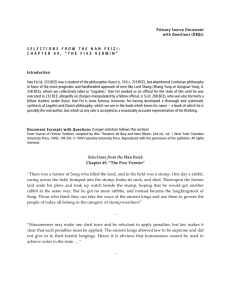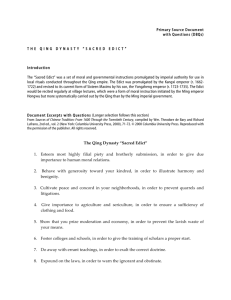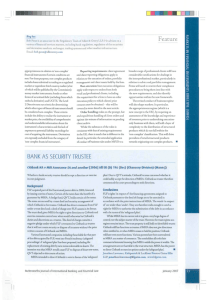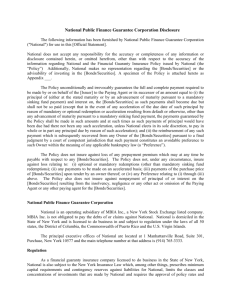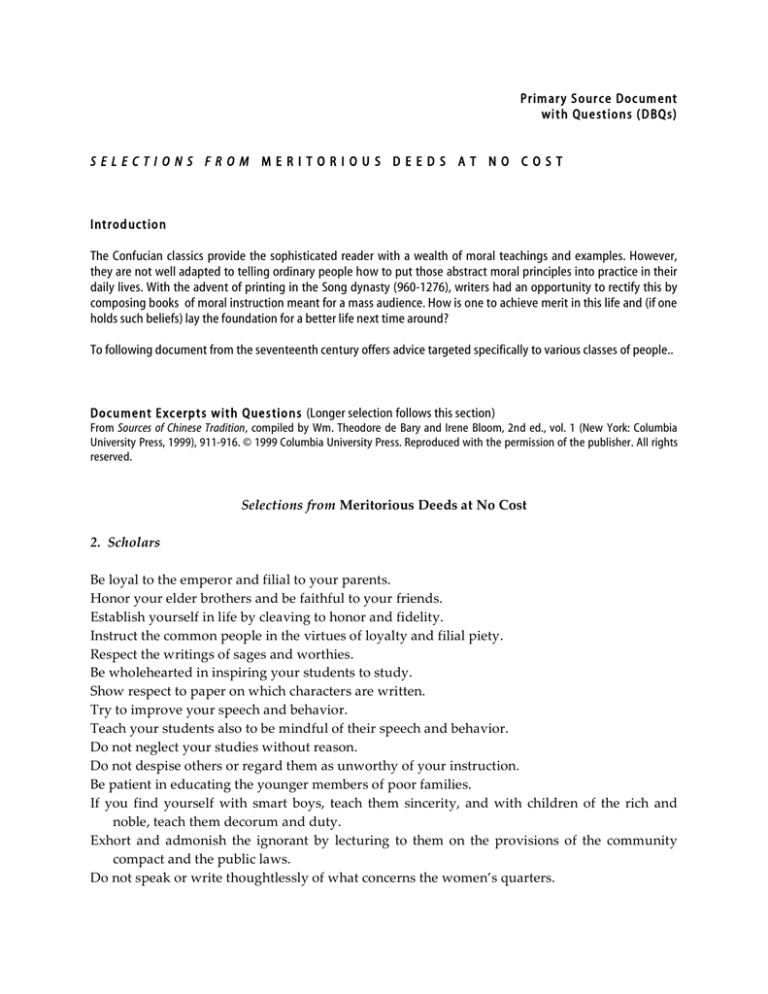
Prim ar y S our ce Doc um ent
wit h Qu est io ns ( D BQs)
SELECTIONS FROM MERITORIOUS DEEDS AT NO COST
Int rod uct io n
The Confucian classics provide the sophisticated reader with a wealth of moral teachings and examples. However,
they are not well adapted to telling ordinary people how to put those abstract moral principles into practice in their
daily lives. With the advent of printing in the Song dynasty (960-1276), writers had an opportunity to rectify this by
composing books of moral instruction meant for a mass audience. How is one to achieve merit in this life and (if one
holds such beliefs) lay the foundation for a better life next time around?
To following document from the seventeenth century offers advice targeted specifically to various classes of people..
Docu ment E xc erpt s w it h Questio ns (Longer selection follows this section)
From Sources of Chinese Tradition, compiled by Wm. Theodore de Bary and Irene Bloom, 2nd ed., vol. 1 (New York: Columbia
University Press, 1999), 911-916. © 1999 Columbia University Press. Reproduced with the permission of the publisher. All rights
reserved.
Selections
from
Meritorious
Deeds
at
No
Cost
2.
Scholars
Be
loyal
to
the
emperor
and
filial
to
your
parents.
Honor
your
elder
brothers
and
be
faithful
to
your
friends.
Establish
yourself
in
life
by
cleaving
to
honor
and
fidelity.
Instruct
the
common
people
in
the
virtues
of
loyalty
and
filial
piety.
Respect
the
writings
of
sages
and
worthies.
Be
wholehearted
in
inspiring
your
students
to
study.
Show
respect
to
paper
on
which
characters
are
written.
Try
to
improve
your
speech
and
behavior.
Teach
your
students
also
to
be
mindful
of
their
speech
and
behavior.
Do
not
neglect
your
studies
without
reason.
Do
not
despise
others
or
regard
them
as
unworthy
of
your
instruction.
Be
patient
in
educating
the
younger
members
of
poor
families.
If
you
find
yourself
with
smart
boys,
teach
them
sincerity,
and
with
children
of
the
rich
and
noble,
teach
them
decorum
and
duty.
Exhort
and
admonish
the
ignorant
by
lecturing
to
them
on
the
provisions
of
the
community
compact
and
the
public
laws.
Do
not
speak
or
write
thoughtlessly
of
what
concerns
the
women’s
quarters.
Prim ar y S our ce Doc um ent , wit h Qu est io ns (D BQ) o n
SELECTIO NS FRO M ME RIT ORI OU S D EED S AT N O COS T
Do
not
expose
the
private
affairs
of
others
or
harbor
evil
suspicions
about
them.
Do
not
write
or
post
notices
that
defame
other
people.
Do
not
write
petitions
or
accusations
to
higher
authorities.
Do
not
write
bills
of
divorce
or
separation.
Do
not
let
your
feelings
blind
you
in
defending
your
friends
and
relatives.
Do
not
incite
gangs
(bang)
to
raid
others’
homes
and
knock
them
down.
Do
not
encourage
the
spread
of
immoral
and
lewd
novels
[by
writing,
reprinting,
expanding,
and
so
on].
…
Quest io ns:
1.
2.
How does this advice imagine the scholar’s role in the community?
What are the core values for scholars, as revealed in this advice?
Lo nger S electio n
From Sources of Chinese Tradition, compiled by Wm. Theodore de Bary and Irene Bloom, 2nd ed., vol. 1 (New York: Columbia
University Press, 1999), 911-916. © 1999 Columbia University Press. Reproduced with the permission of the publisher. All rights
reserved.
Selections
from
Meritorious
Deeds
at
No
Cost
1.
Local
Gentry
Take
the
lead
in
charitable
donations.
Rectify
your
own
conduct
and
transform
the
common
people.
Make
a
sincere
effort
to
inform
the
authorities
of
what
would
be
beneficial
to
the
people
of
your
locality.
Make
every
effort
to
dissuade
the
local
authorities
from
doing
what
would
be
detrimental
to
the
people
of
your
locality.
If
people
have
suffered
a
grave
injustice,
expose
and
correct
it.
Settle
disputes
among
your
neighbors
fairly.
When
villagers
commit
misdeeds,
admonish
them
boldly
and
persuade
them
to
desist.
Do
not
let
yourself
be
blinded
by
emotion
and
personal
prejudice.
Be
tolerant
of
the
mistakes
of
others.
Be
willing
to
listen
to
that
which
is
displeasing
to
your
ears.
Do
not
make
remarks
about
women’s
sexiness.
Do
not
harbor
resentment
when
you
are
censured.
Protect
virtuous
people.
Hold
up
for
public
admiration
women
who
are
faithful
to
their
husbands
and
children
who
are
obedient
to
their
parents.
Asia fo r E du cators | Colu mbia U niv ersit y | htt p:/ /af e. ea sia.colu mbia. e du
Page 2 of 6
Prim ar y S our ce Doc um ent , wit h Qu est io ns (D BQ) o n
SELECTIO NS FRO M ME RIT ORI OU S D EED S AT N O COS T
Restrain
those
who
are
stubborn
and
unfilial.
Prevent
plotting
and
intrigue.
Endeavor
to
improve
manners
and
customs.
Encourage
fair
and
open
discussion.
Prevent
your
household
slaves
and
servants
from
causing
trouble
by
relying
on
your
influence.
Try
not
to
arouse
the
resentment
of
others
by
showing
partiality
to
the
younger
members
of
your
own
family.
Do
not
provoke
incidents
that
result
in
harm
or
loss
to
others.
Do
not
be
arrogant,
on
account
of
your
own
power
and
wealth,
toward
relatives
who
are
poor
or
of
low
status.
Persuade
others
not
to
seek
gain
through
oppression
or
honors
through
intrigue.
Do
not
encroach
on
others’
lands
and
dispossess
them.
Do
not
scheme
to
buy
up
others’
property.
Do
not
mix
debased
silver
with
good.
Do
not
ignore
your
own
relatives
and
treat
others
as
if
they
were
your
kin.
Influence
other
families
to
cherish
good
deeds.
Do
not
officiously
take
charge
of
the
affairs
of
those
outside
your
own
household.
Do
not
disport
yourself
with
lewd
friends.
Do
not
look
for
pretexts
to
injure
others.
Do
not
allow
yourself
to
be
overcome
by
personal
feelings
and
therefore
treat
others
unjustly.
Do
not
let
your
feelings
of
pleasure
and
displeasure
influence
others
or
suggest
to
them
how
they
can
benefit
themselves.
Restrain
others
from
arranging
lewd
theater
performances.
Do
not
scheme
to
seize
geomantic
advantages
(fengshui)
for
yourself
or
deceitfully
deprive
others
of
them.
Instruct
your
children,
grandchildren,
and
nephews
to
be
humane
and
compassionate
toward
all
and
to
avoid
anger
and
self‑indulgence.
Do
not
deceive
or
oppress
younger
brothers
or
cousins.
Do
not
force
others
off
the
road
by
dropping
stones
in
dangerous
places.
Do
not
scheme
to
deprive
others
of
some
advantage
in
order
to
suit
your
own
convenience.
Encourage
others
to
read
and
study
without
minding
the
difficulties.
Urge
others
to
esteem
charity
and
disdain
personal
gain.
Do
not
underestimate
the
value
of
others
[or
underpay
them].
Do
not
let
what
you
hear
from
servants
and
slaves
cause
you
to
turn
against
relatives
and
friends.
Persuade
others
to
settle
lawsuits
through
conciliation.
Try
to
settle
complaints
and
grievances
among
others.
Do
not
force
others
to
lend
you
their
property.
Do
not
force
others
to
enter
into
deals
on
credit.
Curb
the
strong
and
protect
the
weak.
Show
respect
to
the
aged
and
compassion
for
the
poor.
Asia fo r E du cators | Colu mbia U niv ersit y | htt p:/ /af e. ea sia.colu mbia. e du
Page 3 of 6
Prim ar y S our ce Doc um ent , wit h Qu est io ns (D BQ) o n
SELECTIO NS FRO M ME RIT ORI OU S D EED S AT N O COS T
Do
not
keep
too
many
concubines.
Do
not
keep
catamites.
Do
not
marry
off
household
slaves
to
wicked
men
or
cripples
for
your
own
selfish
gain.
Choose
a
favorable
time
for
marrying
off
household
slaves.
Do
not
force
“good”
people
to
become
base
[i.e.,
lose
their
freedom].
2.
Scholars
Be
loyal
to
the
emperor
and
filial
to
your
parents.
Honor
your
elder
brothers
and
be
faithful
to
your
friends.
Establish
yourself
in
life
by
cleaving
to
honor
and
fidelity.
Instruct
the
common
people
in
the
virtues
of
loyalty
and
filial
piety.
Respect
the
writings
of
sages
and
worthies.
Be
wholehearted
in
inspiring
your
students
to
study.
Show
respect
to
paper
on
which
characters
are
written.
Try
to
improve
your
speech
and
behavior.
Teach
your
students
also
to
be
mindful
of
their
speech
and
behavior.
Do
not
neglect
your
studies
without
reason.
Do
not
despise
others
or
regard
them
as
unworthy
of
your
instruction.
Be
patient
in
educating
the
younger
members
of
poor
families.
If
you
find
yourself
with
smart
boys,
teach
them
sincerity,
and
with
children
of
the
rich
and
noble,
teach
them
decorum
and
duty.
Exhort
and
admonish
the
ignorant
by
lecturing
to
them
on
the
provisions
of
the
community
compact
and
the
public
laws.
Do
not
speak
or
write
thoughtlessly
of
what
concerns
the
women’s
quarters.
Do
not
expose
the
private
affairs
of
others
or
harbor
evil
suspicions
about
them.
Do
not
write
or
post
notices
that
defame
other
people.
Do
not
write
petitions
or
accusations
to
higher
authorities.
Do
not
write
bills
of
divorce
or
separation.
Do
not
let
your
feelings
blind
you
in
defending
your
friends
and
relatives.
Do
not
incite
gangs
(bang)
to
raid
others’
homes
and
knock
them
down.
Do
not
encourage
the
spread
of
immoral
and
lewd
novels
[by
writing,
reprinting,
expanding,
and
so
on].
Do
not
call
other
people
names
or
compose
songs
making
fun
of
them.
Publish
morality
books
in
which
are
compiled
things
that
are
useful
and
beneficial
to
all.
Do
not
attack
or
vilify
commoners;
do
not
oppress
ignorant
villagers.
Do
not
deceive
the
ignorant
by
marking
texts
in
such
a
way
as
to
overawe
and
mislead
them.
Do
not
show
contempt
for
fellow
students
by
boasting
of
your
own
abilities.
Do
not
ridicule
other
people’s
handwriting.
Do
not
destroy
or
lose
to
books
of
others.
…
To
those
of
some
understanding
explain
the
teachings
of
the
Cheng‑Zhu
school;
to
the
uneducated
give
books
on
moral
retribution.
Asia fo r E du cators | Colu mbia U niv ersit y | htt p:/ /af e. ea sia.colu mbia. e du
Page 4 of 6
Prim ar y S our ce Doc um ent , wit h Qu est io ns (D BQ) o n
SELECTIO NS FRO M ME RIT ORI OU S D EED S AT N O COS T
Make
others
desist
from
unfiliality
toward
their
parents
or
unkindness
toward
relatives
and
friends.
Educate
the
ignorant
to
show
respect
to
their
ancestors
and
live
in
harmony
with
their
families.
…
3.
Agriculturalists
Do
not
miss
the
proper
times
for
farmwork.
Have
regard
for
[the
lives
of]
insects.
When
fertilizing
the
fields,
do
not
harm
living
creatures.
Do
not
obstruct
or
cut
off
paths.
Fill
up
holes
that
might
give
trouble
to
passersby.
Do
not
instigate
landlords
to
buy
up
lands.
Do
not
steal
and
sell
your
master’s
grain
in
connivance
with
his
servants.
Do
not
damage
crops
in
your
neighbors’
fields
by
leaving
animals
to
roam
at
large,
relying
on
your
landlord’s
power
and
influence
to
protect
you.
Do
not
encroach
[on
others’
property]
beyond
the
boundaries
of
your
own
fields
and
watercourses,
thinking
to
ingratiate
yourself
with
your
landlord.
Do
not
disturb
others’
graves
or
interfere
with
the
geomantic
advantages
of
others.
In
plowing,
do
not
infringe
on
graves
or
make
them
hard
to
find.
Do
not
suggest
to
your
master
that
he
willfully
cut
off
watercourses
and
extort
payments
from
neighbors.
Do
not
take
your
landlord’s
seed
crop
for
your
own
benefit.
Do
not
damage
the
crops
in
neighboring
fields
out
of
envy
because
they
are
so
flourishing.
Do
not
instigate
your
landlord
to
take
revenge
on
a
neighbor
on
the
pretext
that
the
neighbor’s
animals
have
damaged
your
crops.
Do
not
through
negligence
in
your
work
do
damage
to
the
fields
of
others.
Do
not
become
lazy
and
cease
being
conscientious
because
you
think
your
landlord
does
not
provide
enough
food
and
wine
or
fails
to
pay
you
enough.
Fill
up
holes
in
graves.
Take
good
care
of
others’
carts
and
tools.
Do
not
kill
mules
and
cattle,
pigs
and
sheep,
even
if
they
eat
your
crops.
Keep
carts
and
cattle
from
trampling
down
others’
crops.
Do
not
desecrate
the
gods
of
the
soil
by
plowing
or
hoeing
the
land
or
irrigating
or
spreading
manure
on
days
of
abstention
[wu,
i.e.,
the
fifth
day
of
each
ten‑day
cycle,
which
is
the
first
of
two
days
identified
with
wood
in
the
Five‑Phases
cycle].
5.
Dealers
and
Merchants
Do
not
deceive
ignorant
villagers
when
fixing
the
price
of
goods.
Do
not
raise
the
price
of
fuel
and
rice
too
high.
When
the
poor
buy
rice,
do
not
give
them
short
measure.
Asia fo r E du cators | Colu mbia U niv ersit y | htt p:/ /af e. ea sia.colu mbia. e du
Page 5 of 6
Prim ar y S our ce Doc um ent , wit h Qu est io ns (D BQ) o n
SELECTIO NS FRO M ME RIT ORI OU S D EED S AT N O COS T
Sell
only
genuine
articles.
Do
not
use
short
measure
when
selling
and
long
measure
when
buying.
Do
not
deceitfully
serve
unclean
dishes
or
leftover
food
to
customers
who
are
unaware
of
the
fact.
Do
not
dispossess
or
deprive
others
of
their
business
by
devious
means.
Do
not
envy
the
prosperity
of
others’
business
and
speak
ill
of
them
wherever
you
go.
Be
fair
in
your
dealings.
Treat
the
young
and
the
aged
on
the
same
terms
as
the
able‑bodied.
When
people
come
in
the
middle
of
the
night
with
an
urgent
need
to
buy
something,
do
not
refuse
them
on
the
ground
that
it
is
too
cold
[for
you
to
get
up
and
serve
them].
Pawnshops
should
lend
money
at
low
interest.
Give
fair
value
when
you
exchange
silver
for
copper
coins.
Especially
when
changing
money
for
the
poor,
be
generous
to
them.
When
a
debtor
owes
you
a
small
sum
but
is
short
of
money,
have
mercy
and
forget
about
the
difference.
Do
not
bring
him
to
bankruptcy
and
hatred
by
refusing
to
come
to
terms.
When
the
poor
want
to
buy
such
things
as
mosquito
nets,
wadded
clothing,
and
quilts,
have
pity
on
them
and
reduce
the
price.
Do
not
refuse
to
come
to
terms.
Asia fo r E du cators | Colu mbia U niv ersit y | htt p:/ /af e. ea sia.colu mbia. e du
Page 6 of 6

